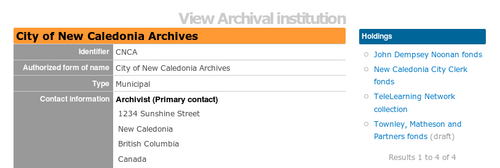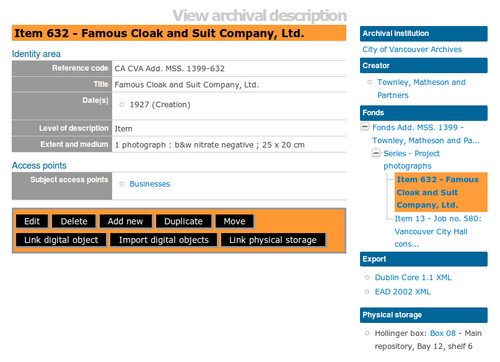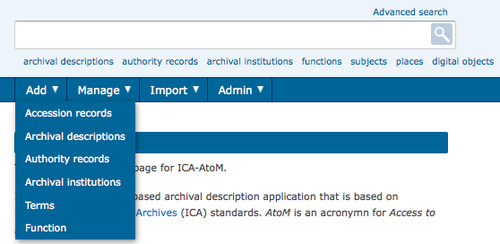Difference between revisions of "Navigate"
| (42 intermediate revisions by 3 users not shown) | |||
| Line 1: | Line 1: | ||
| − | + | [[Main Page]] > [[User manual]] > [[Access content]] > Navigate | |
| − | + | Navigating involves understanding the current location (entity and page), what can be done from that location (view, edit, add new, search, etc.), how to get related entities, and how to go to other pages to do other things unrelated to the current entity. | |
| − | |||
| − | + | <div class="clearfix"> | |
| + | == Page title == | ||
| − | + | [[Image:holdings.png|500px|right|thumb|The light grey text which says "View Archival institution" is the page title]] | |
| + | The [[Glossary#Page title|page title]] displays what [[Entity types|type of entity]] you are looking at ([[Glossary#Archival description|archival description]], [[Glossary#Authority record|authority record]], [[Glossary#Archival institution|archival institution]], [[Glossary#Function|function]] or [[Glossary#Term|term]]) and what [[Page types|type of page]] you are on ([[Glossary#Edit page|edit]], [[Glossary#View page|view]], import, etc.). | ||
| − | + | </div> | |
| − | |||
| − | + | <div class="clearfix"> | |
| − | + | == Title bar == | |
| − | + | [[Image:holdings.png|500px|right|thumb|Click on the orange title bar reading "City of New Caledonia Archives" to switch back and forth between the view and edit pages]] | |
| + | On a [[Glossary#View page|view]] or [[Glossary#Edit page|edit]] page, the [[Glossary#Title bar|title bar]] displays the name of the current entity. You can also click on the [[Glossary#Title|title]] to switch between between [[Glossary#View mode|view]] and [[Glossary#Edit mode|edit]] modes (if you have edit [[Glossary#Access privilege|access privileges]]). | ||
| − | + | </div> | |
| − | |||
| + | <div class="clearfix"> | ||
| − | + | == Search box == | |
| − | + | [[Image:browseOptions.png|500px|right|thumb|Search box - the user enters a query and clicks on the magnifying glass icon]] | |
| − | + | The [[Glossary#Search box|search box]] is available on every page: enter a query and click on the magnifying glass icon or press Enter on your keyboard | |
| + | <div class="note"> | ||
| − | + | Be careful when launching a search from the [[Glossary#Edit page|edit page]]: '''always be sure to first save your changes, or else these will be lost when the search/browse occurs.''' | |
| − | + | </div> | |
| + | </div> | ||
| − | |||
| − | + | <div class="clearfix"> | |
| − | + | == Browse menu == | |
| + | [[Image:browseOptions.png|500px|right|thumb|The browse menu in the default Caribou theme is a horizontal list of links directly below the search box]] | ||
| − | + | The [[Glossary#Browse menu| browse menu]] is available on every page: enter a query and click on the magnifying glass icon or press Enter on your keyboard | |
| − | + | <div class="note"> | |
| + | Be careful when launching a search from the [[Glossary#Edit page|edit page]]: '''always be sure to first save your changes, or else these will be lost when the search/browse occurs.''' | ||
| − | + | </div> | |
| − | + | </div> | |
| − | + | == Text links == | |
| − | + | Blue text always represents a link to a related entity (e.g. from an [[Glossary#Archival description|archival description]] to the [[Glossary#Authority record|authority record]] of the record's [[Glossary#Creator|creator]]). When you hover your cursor over a link, the text is highlighted or underlined. | |
| − | |||
| − | + | <div class="clearfix"> | |
| + | == Context menu == | ||
| − | + | [[Image:contextMenu.png|500px|right|thumb|Context menu for an archival description showing archival institution, name of creator and other records in the same fonds]] | |
| − | + | Provides a series of links to entities related to the current entity. | |
| + | |||
| + | See [[context menu]] for more on this feature as it applies to different [[entity types]]. | ||
| + | |||
| + | </div> | ||
| + | |||
| + | |||
| + | == Home page links == | ||
| + | |||
| + | The [[Glossary#Site logo|site logo]] and the "home" link in the [[Glossary#User menu|user menu]] both return you to the [[Glossary#Home page|home page]]. | ||
| + | |||
| + | |||
| + | <div class="clearfix"> | ||
| + | |||
| + | == Main menu == | ||
| + | |||
| + | [[Image:addMenu.png|500px|right|thumb|Main menu with Add drop-down expanded]] | ||
| + | |||
| + | The [[Glossary#Main menu|main menu]] provides access to key functions. The tabs are: Add, Manage, Import and Admin. Selecting the Manage menu gives the user access to all saved accession records, donor records, rights holders and physical storage containers. | ||
| + | |||
| + | </div> | ||
| + | |||
| + | <div class="note"> | ||
| + | |||
| + | What appears in the [[Glossary#Main menu|main menu]] depends on your [[Glossary#User role|user role]]. For example, the main menu does not appear at all for [[Glossary#Researcher|researchers]] while the [[Glossary#Admin menu|admin menu]] appears only to users with [[Glossary#Administrator|administrator]] [[Glossary#Access privilege|access privileges]]. | ||
| + | |||
| + | </div> | ||
| + | |||
| + | |||
| + | </div> | ||
| + | |||
| + | == Column headers == | ||
| + | |||
| + | [[Glossary#Column header|Column headers]] appear on list pages, giving the names of the [[Glossary#Field|fields]] for whatever is listed below. | ||
| + | |||
| + | |||
| + | [[Category:User manual]] | ||
| + | |||
| + | __NOTOC__ | ||
Latest revision as of 19:21, 1 December 2011
Please note that ICA-AtoM is no longer actively supported by Artefactual Systems.
Visit https://www.accesstomemory.org for information about AtoM, the currently supported version.
Main Page > User manual > Access content > Navigate
Navigating involves understanding the current location (entity and page), what can be done from that location (view, edit, add new, search, etc.), how to get related entities, and how to go to other pages to do other things unrelated to the current entity.
Page title
The page title displays what type of entity you are looking at (archival description, authority record, archival institution, function or term) and what type of page you are on (edit, view, import, etc.).
Title bar
On a view or edit page, the title bar displays the name of the current entity. You can also click on the title to switch between between view and edit modes (if you have edit access privileges).
Search box
The search box is available on every page: enter a query and click on the magnifying glass icon or press Enter on your keyboard
Be careful when launching a search from the edit page: always be sure to first save your changes, or else these will be lost when the search/browse occurs.
The browse menu is available on every page: enter a query and click on the magnifying glass icon or press Enter on your keyboard
Be careful when launching a search from the edit page: always be sure to first save your changes, or else these will be lost when the search/browse occurs.
Text links
Blue text always represents a link to a related entity (e.g. from an archival description to the authority record of the record's creator). When you hover your cursor over a link, the text is highlighted or underlined.
Provides a series of links to entities related to the current entity.
See context menu for more on this feature as it applies to different entity types.
Home page links
The site logo and the "home" link in the user menu both return you to the home page.
The main menu provides access to key functions. The tabs are: Add, Manage, Import and Admin. Selecting the Manage menu gives the user access to all saved accession records, donor records, rights holders and physical storage containers.
What appears in the main menu depends on your user role. For example, the main menu does not appear at all for researchers while the admin menu appears only to users with administrator access privileges.
Column headers
Column headers appear on list pages, giving the names of the fields for whatever is listed below.



